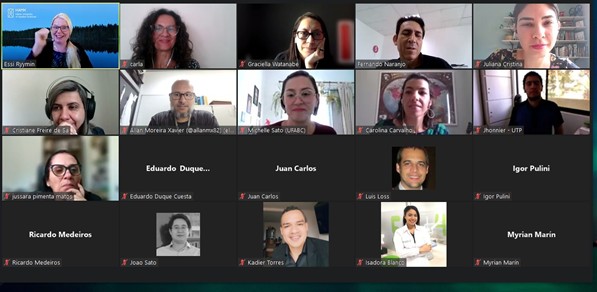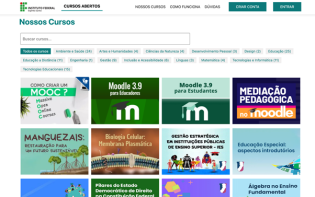Development and pilot offer of MOOCs in the EMBRACE project: the multiplicity of knowledge from the perspective of the UFABC team.
Published 24 February 2025

Photo by: UFABC Team
The development of three MOOCs by teams of experts and IDs followed a collaborative, competency-based approach, promoting pedagogical innovation. Despite cultural and linguistic challenges, courses were successfully offered in three languages on digital and pedagogical skills, aligned with the EMBRACE project’s objectives.
The development and pilot offer of the three massive open courses (MOOCs), planned by the teams of Institutional Developers (IDs) and Experts from each partner institution, involved collegiate meetings (meetings, kick-offs, training, consultations, workshops, among others), most of which were organised in virtual format, when the digital competences were established, in accordance with the DigicompEdu guidelines, grouped into the three different MOOCs produced. The MOOCs are instantiated in the AVA MOODLE of the Federal Institute of Espírito Santo (IFES) and the entire structure common to the three courses followed the institution’s MOOC development methodology, which managed the entire process. The development of content and activity proposals by the partner teams followed the competency-based approach and student-centred learning.
MOOC development: multiplicity of knowledge
The strategy of working in teams was fundamental to the development of the MOOC courses, enabling the efficient distribution of tasks and the utilisation of the specific skills of each ID. UFABC was represented by two Experts (Carla Rodriguez and Carolina Carvalho), who worked on the development of MOOC 1, focused on ‘Digital and Pedagogical Competences’ (Digipeda). Two other UFABC IDs (Allan Xavier and João Sato) took part in MOOC 2, which dealt with ‘Active Pedagogies Using Digital Tools’, and two IDs (Michelle Sato and Júlio Facó) were involved in creating MOOC 3, which dealt with ‘Digital Competences and Innovation in the World of Work’. The interaction between the IDs and the Experts was essential to the development of the MOOCS. While the IDs ensured that the courses were accessible, dynamic and well-structured, the Experts ensured the academic quality and relevance of the content. This collaboration resulted in the creation of courses that balance pedagogical innovation and academic depth, meeting both the immediate training needs of teachers and the strategic objectives of the EMBRACE project.
Benefits and challenges of cultural diversity
Although developing MOOC courses with a culturally diverse team can bring many benefits, it also presents some challenges arising from the heterogeneity of the people involved. From the perspective of the EMBRACE UFABC team, among the benefits, it is possible to highlight the multiplicity and diversity of experiences, which make it possible to implement more creative and innovative solutions to educational problems. Cultural diversity in the context of the development of MOOCs at EMBRACE enriched the brainstorming process and the discussion of possibilities and ways of presenting content. In addition, it was possible to promote the personal and professional development of the teams, with opportunities to participate in a multicultural environment, requiring both global and specific competences, such as multilingual communication and project management.
With regard to the challenges inherent in cultural diversity, it is worth emphasising that the language barrier can be singled out as one of the points of greatest attention. Language differences, both in vocabulary and in verbal structure and expression, sometimes resulted in misunderstandings and communication difficulties, requiring more time for meetings and implying the need to redo some activities. Time and schedule management also had an impact on the development of the courses, both due to time zone differences and the pace of work imposed on the teams. Finally, it is worth mentioning the challenge of developing a MOOC that incorporates within itself the educational strategies it is intended to disseminate. A MOOC with innovative educational content must be educationally innovative, so as not to result in a contradiction. In this respect, the competency-based approach, student-centred learning and educational inclusion and accessibility strategies were both difficult and innovative, especially considering not only the multicultural diversity but also the interdisciplinary nature of the participants. The result of the efforts made by the multicultural team is reflected in the three MOOC courses designed in three languages (English, Portuguese and Spanish):
- MOOC 1: Digital and Pedagogical Competences – DigiPeda was held between 2 May and 16 June 2024, addressing the development of digital competences applied to the teaching-learning process.
- MOOC 2: Active Pedagogies Using Digital Tools took place between 26 August and 29 September 2024, exploring innovative pedagogical methodologies using digital technologies.
- MOOC 3: World of Work: Digital skills and innovation, focusing on digital skills and the relationship with the labour market, took place between 15 October and 10 December 2024.
The courses reflect Embrace’s commitment to training teachers, promoting pedagogical innovation and the use of digital technologies in teaching, with the aim of developing digital and pedagogical skills and encouraging the use of active methodologies.



